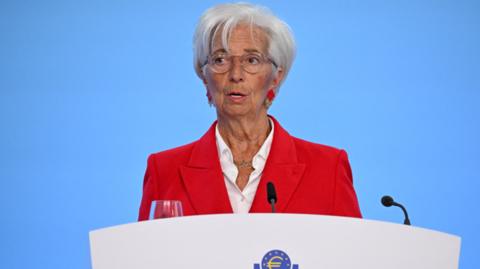"Stronger-than-expected" economic growth of 0.3% between January and March may weaken as the year goes on, the central bank said.
On Wednesday, Trump doubled tariffs on EU steel and aluminium imported to the US from 25% to 50%.
Trump has paused the taxes on other European goods sold to the US until 9 July as talks to reach a deal continue but a 10% tariff remains in place until then.
Meanwhile, the EU has drawn up its own list of tariffs on €21bn-worth of US goods.
However, the ECB expects the economy will gather pace in the medium-term, boosted by European spending on defence and infrastructure.
Nato is pushing for members of the military alliance to commit more funding to shore up defence in Europe as Russia continues to wage a war on Ukraine.
Recent figures showed that inflation across the 20-member eurozone had fallen below the ECB's 2% target, easing to 1.9% in April.
Inflation is expected to stay around the target between 2025 and 2027.
ECB president Christine Lagarde said on Thursday that higher incomes and a "robust" employment market "will allow households to spend more".
She said this would help "make the economy more resilient to global shocks".
However, she admitted that a great deal of uncertainty remain over the economy, in large part due to trade policies.
Germany's Chancellor Friedrich Merz will meet Trump in the White House on Thursday where they are expected to discuss tariffs as well as defence spending.
